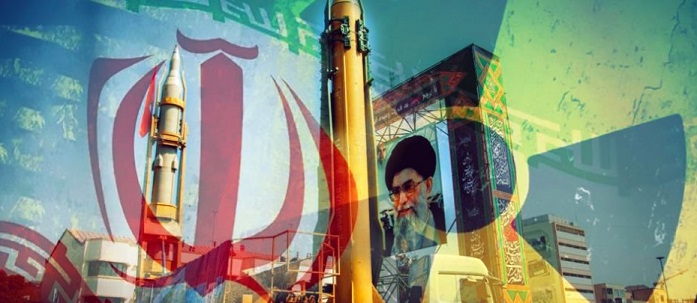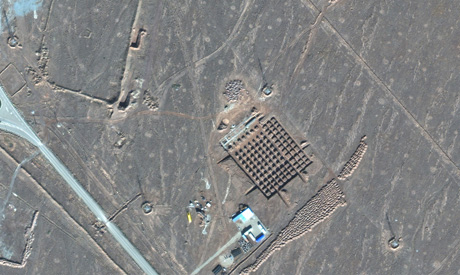Iran Gets Closer To Becoming A Nuclear Power

The Biden administration on Thursday rescinded former President Donald Trump’s restoration of U.N. sanctions on Iran, an announcement that could help Washington move toward rejoining the Joint Comprehensive Plan of Action (JCPOA) or the Iran nuclear deal aimed at reining in the Islamic Republic’s nuclear program, in addition to containing its middle to long range missiles and its malign behavior in the region.
The U.S. has agreed to release $ 3 billion in Iranian funds that have been frozen in Iraq, Oman and South Korea as a result of the sanctions imposed after Trump pulled out of the JCPOA, — the Trump sanctions were deemed unsuccessful since the regime only got stronger as it accelerated its nuclear ambitions.
Hamid Hosseini, board member of the Iran-Iraq Joint Chamber of Commerce, had tweeted on Friday that Washington approved the release of frozen Iranian assets at the Trade Bank of Iraq, without mentioning the value of the assets.
Pope Francis’ Indirect Role?
The partial lifting of the sanctions occurred just as Pope Francis made his historic trip to Iraq to promote “peace and tolerance.” Days prior the Francis’ visit, the U.S. al-Asad air base in Iraq was attacked by a local Shi’ite militia. And then shortly after the Pope left, the Iranian-backed Houthis launched missiles and suicide drones at the oil facilities in Ras Tanura, one of the largest Saudi refineries on the Persian Gulf.
As Tsvi Sadan of Israel Today says, the Pope has joined Europe’s policy of pacification toward the Shi’ites, led by Iran, which has also become the policy of the new White House administration — in March of last year, Ayatollah Mostafa Mohaghegh Damad, who is a senior member of the Academy of Sciences of Iran, went so far to ask Pope Francis to intervene with the U.S. to lift the embargoes arguing that they are impeding the government from properly handling the coronavirus. This is quite a formidable coalition whereby the West and Christendom seem now to prefer the Shi’ite over the Sunni Muslims. In the wake of 9/11 and ISIS, it is the Sunnis who are apparently now seen as more militant and dangerous to global security than the Shiites, some of whom are now perceived as saints of a sort who have protected Christians.

This is the meaning of the sign seen displayed in Bagdad, showing a kind of heavenly trinity of Mary, Qasem Soleimani and Abu Mahdi al-Muhandis, the two latter having been killed by the Americans. The Iranians want the world to believe that these two represent true guardians of the Christians. “The Christians of Iraq,” reads the sign, “will never forget the liberation of their regions from [ISIS] terror.”
The Pope also met with Iraq’s principal Shi’ite leader, Grand Ayatollah Ali al-Sistani, and then held an interreligoius meeting in the ancient city of Ur, which is traditionally considered to be the birthplace of the biblical patriarch Abraham — there were no Jewish leaders present at the “Abrahamic” gathering. In any case, not to undermine the encouragement towards Christians and other religious minorities, it cannot be dismissed that the papal visit to Iraq was divorced from any geo-politics that sought to present a moderate and morally-inclined Iran.
The Shrewd Fatwa
Iranian Supreme Leader Ayatollah Khamenei had previously declared that Islamic law prohibits the production or use of nuclear weapons. On his official website, Khamenei added that “Both sharia [Islamic laws] and aqli [related to logic and reason] fatwas — a religious decision made by mufti (Islamic scholar who is an interpreter or expounder of Islamic law) — dictate that we do not pursue them.”
Dr. Majid Rafizadeh, president of the International American Council on the Middle East, explains, the aforementioned “fatwa of banning nuclear weapons has been the Iranian regime’s answer on international stage to prove that their nuclear program is solely for peaceful purposes. When Iran’s Foreign Minister Javad Zarif met with U.S. Senator Rand Paul, in 2019, for example, Zarif told Paul about Iran’s unwillingness to seek nuclear weapons precisely because of Khamenei’s fatwa.”
Other world leaders, such as then-President Barack Hussein Obama, also bought into the Supreme Leader’s fatwa to support Iran’s claim that it does not want a nuclear bomb. Obama, in an attempt to reach a nuclear deal and appease the Iranian regime, went so far to say during his address to the U.N. General Assembly in 2013 that “The Supreme Leader has issued a fatwa against the development of nuclear weapons.”
It must be known that the Iranian Shi’ites are masters of taqiyya (the art of deception or lying) and have led the international community to believe that Iran, notwithstanding its sponsor of terrorism, is a true friend of the Christian West, or at least more so than the U.S. which has substantially supported the Sunnis who have been responsible for so much chaos in the Middle East and abroad.

Let it be known that the mullahs are continuing to build up its stockpile of low-enriched uranium and now holds roughly twelve times the amount permitted under the 2015 JCPOA, according to a report by the United Nations Atomic Agency.
The report’s findings underscore the challenge the Biden administration faces in persuading Tehran to return to the 2015 nuclear deal. Aside the stockpile of low-enriched uranium, which when further refined can be used to fuel a nuclear weapon, Iran is also taking steps to accelerate its production of low-enriched uranium and is continuing its nuclear research.
Iran’s Public Intention to Build a Nuclear Bomb
Tehran has acknowledged for the first time that it might pursue openly obtaining nuclear weapons.
In a live interview on February 10, Iranian Intelligence Minister Mahmoud Alavi, a close advisor to the Khamenei, pointed out recently that Iran might in fact very likely pursue that path:
“I must make it clear that if a cat is pushed into the corner, it may behave differently from a cat that walks freely. If Iran is pushed into a corner, it will not be its fault [i.e., the pursuit of nuclear weapons] but rather the fault of those pushing it.”
This statement is more than revealing. The Iranian leaders have long argued that there is no way they can seek nuclear weapons due to the fatwa issued by Khamenei. Aside that a fatwa can be changed at any time, as Rafizadeh points out, the Islamic Republic of Iran’s constitution permits the government to pass laws prioritizing those codified laws over religious rulings and fatwas. Article 167 says that the “the judge is bound to endeavor to judge each case on the basis of the codified law [passed by the parliament and endorsed by the Guardian Council].” Then it adds, “In case of the absence of any such law, he has to deliver his judgment on the basis of authoritative Islamic sources and authentic fatwa.”
In other words, the Iranian parliament can spontaneously pass a law allowing the government to pursue nuclear weapons, one that would override any fatwa that banned a nuclear program. Perhaps this is why U.S. Secretary of State Antony Blinken said in February that Iran could be “weeks away” from having sufficient material to develop a nuclear weapon if it continues to violate the 2015 nuclear deal. And regrettably, unless there is a change of government, this nuclear chaos can only be managed, at best.
__________________________________________________

Mario Alexis Portella is a priest of the Cathedral of Santa Maria del Fiore and Chancellor of the Archdiocese of Florence, Italy. He has a doctorate in canon law and civil law from the Pontifical Lateran University in Rome; he also holds a M. A. in Medieval History from Fordham University, as well as a B.A. in Government & Politics from St. John’s University. He is also author of Islam: Religion of Peace? – The Violation of Natural Rights and Western Cover-Up.

Book available on Amazon, Barnes & Noble or WestBow Press.





Recent Comments